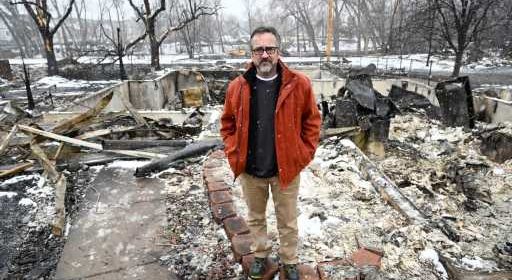Dave Crawford has been a voice for animals in Colorado for more than 40 years

SUPERIOR — The delicate paw impressions in the snow-dusted path leading to Dave Crawford’s burnt-down home in Superior’s Original Town stopped the long-time animal activist in mid-stride.
“Those look like squirrel tracks — could be the ones I used to watch from my window every day,” he said, scanning the scorched and denuded trees lining the alley beyond his incinerated garage, a smile sneaking across his grizzled face. “That’s the best thing I’ve seen all day.”
It’s through animals that the 60-year-old Iowa native takes inventory of his blackened and flattened neighborhood, pointing out in a 360-degree sweep which creatures survived and which perished in the Marshall fire. Two dogs were rescued from houses across West William Street from his, but a block to the west, a tortoise, turtle and cockatiel weren’t so lucky.
“It was heartbreaking — it wakes me up at night,” said Crawford, who grabbed his two cats before escaping the advancing flames. “To think how utterly dependent they are on us.”
The wind-fueled wildfire that swept through Superior and Louisville, destroying nearly 1,100 homes in a matter of hours, prompted Crawford to start developing an app that will allow neighbors to alert one another during emergencies that they have animals that need rescuing. Hundreds of Boulder County families have been desperate to find out what happened to their pets in the wake of the Dec. 30 fire.
“I was driving by houses that had animals inside that would be dead in 90 minutes and I’m unaware of that,” Crawford said. “I had time to rescue a lot of animals but I didn’t know they needed rescuing.”
The work on the app is being done by the nonprofit organization, Animal Help Now, which Crawford founded a decade ago and still leads today as executive director. Animal Help Now puts people across the United States in contact with local wildlife rehabilitation organizations should they come across an injured or orphaned animal, like a bird having flown into a window or a bear cub abandoned after its mother is struck and killed by a car.
The organization also provides contacts to no-kill wildlife handlers who can remove a family of raccoons from an attic or a skunk from under the porch.
“We have the definitive list of humane wildlife control operators,” Crawford said.
While Crawford ran Animal Help Now out of his former Superior home, relying on a group of 30 volunteers to help keep the website going, he said the organization is well backed up on the cloud. Elena Rizzo, research director and wildlife rehabilitator liaison for the organization, said she isn’t surprised by Crawford’s need to jump back into his animal advocacy work so soon after experiencing his own life-altering tragedy.
Since the fire, she said Crawford was busy trying to get information on a moose that someone reported being stuck in a fence in the Colorado mountains (it turned out, upon further investigation, that the moose was fine).
“And immediately he’s trying to help animals in the area,” she said. “I would say Dave goes the extra mile for every animal. He’s one of the most passionate people I know.”
It’s a passion, Crawford said, that stemmed from his work in an Iowa pig slaughterhouse as a teenager. That job opened his eyes to the treatment of animals on factory farms and served as a “catalyst” to making a career working on their behalf.
He started the group Rocky Mountain Animal Defense in the 1990s in Boulder County, and was involved in numerous campaigns to fight animal cruelty and habitat destruction. RMAD took on the company that made Nalgene bottles nearly 20 years ago, highlighting its role in also manufacturing restraint devices for laboratory animals.
NOMINATE A NEIGHBOR
This story is part of a project highlighting the many unique individuals across Colorado.
Do you know someone we should know? Tell us about your neighbor, friend or family member who has a story Colorado should hear.
Crawford and his group convinced voters in Estes Park to vote down a wildlife zoo that had been proposed near the entrance of Rocky Mountain National Park, where those same animals roamed freely in their natural habitat. RMAD also fought against the use of animals in Ringling Bros. and Barnum & Bailey Circus productions. In 2017, Ringling Bros. ended operations after nearly a century and a half, in part because of concerns over treatment of its animals.
RMAD later became synonymous with prairie dog preservation and in 1999 took on tea maker Celestial Seasonings after it was discovered that the company had been poisoning the animals on its property in Boulder.
“We were PETA-like,” Crawford said, referring to the group’s more confrontational approach to animal advocacy at the time.
That’s when Dan Hanley knew Crawford best, working alongside him on a campaign to oppose the University of Colorado’s use of live dogs in lab experiments.
“He envisions a world where there is no animal cruelty — where we don’t treat animals as products or the way we treat them today,” said Hanley, who works for a non-profit fundraising firm in California.
He credits Crawford, a vegan for decades, for being “passionate and methodical” and “super smart and super strategic” when it comes to organizing and executing campaigns on behalf of animals. But mostly, he said, it’s about giving animals a few victories in a world that gives them few.
“Dave is just a guy who wants to make the world a better and safer place for animals,” Hanley said.
Source: Read Full Article

